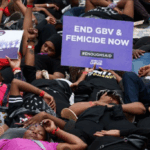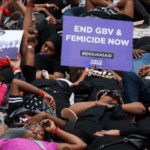
The pervasive crisis of Gender-Based Violence (GBV) is driving urgent demands for decisive policy changes and legal enforcement globally. Recent high-profile protests and political action in Africa highlight the universal struggle against this scourge. While international bodies recognise the immense scale of the issue, activists worldwide are pushing governments to translate crisis declarations into concrete action to protect women and girls.
Key Data and Statistics on Violence
Data from reputable organisations highlights the severity and universal nature of the crisis. Globally, nearly one in three women—approximately 736 million—have experienced intimate partner or non-partner sexual violence in their lifetime. The World Health Organization (WHO) estimates that intimate partner violence affects 30% of women worldwide. The UN Women emphasises the global impact, with a spokesperson stating, “There can be no higher priority for our support than women.”
In the year 2023, approximately 51,100 women and girls globally were killed by intimate partners or family members, according to the UN Office on Drugs and Crime (UNODC) and UN Women. This means an average of 140 women or girls lost their lives every day at the hands of those closest to them. In South Africa, the rate at which women are killed is five times higher than the global average, according to UN Women. Research shows the country recorded an estimated 10,972 femicide cases over the past 20 years. The African Development Bank estimates that for every 1% increase in women subjected to GBV, national economic activities are reduced by up to 8%. In Ghana, studies show that around one in three women are likely to experience domestic violence.
Global Reach of Gender-Based Violence
Gender-Based Violence is a universal human rights violation, affecting women regardless of region or economic status, though its forms and severity vary. In The Americas and Europe, the OECD reports that almost a quarter (23%) of women across its member countries have experienced intimate partner physical or sexual violence. In the United States, an estimated 10 million people experience domestic violence every year. In Europe and the Americas, intimate partners are the primary perpetrators of family-related femicides. In Asia and the Middle East, while the relative rate of intimate partner violence in these regions can vary, violence against women remains pervasive. A regional study in the Arab States found that 60% of women internet users had been exposed to online violence. Asia is the region with the largest absolute number of female homicides. “Honor killings” and dowry-related violence remain critical issues in parts of the Middle East and South Asia.
South Africa’s Policy Shift Following the “G20 Women’s Shutdown”
In South Africa, the prevalence of attacks on women has led to the issue being officially described as a “national crisis.” This sentiment was amplified by a nationwide “purple protest” demanding GBV be classified as a national disaster. The campaign, organised by the non-profit group Women for Change, saw women urged to “withdraw from the economy for one day.” They were asked to lie down for 15 minutes in honor of the 15 women reportedly murdered daily. Allies in Eswatini, Kenya, and Namibia also expressed solidarity.
Following the pressure, an important policy shift was announced. President Cyril Ramaphosa, speaking at the G20 Social Summit on November 20, 2025, confirmed that Gender-Based Violence and Femicide (GBVF) will be classified as a National Disaster. This followed his earlier statement to the G20 Social Summit that South Africa had “declared gender-based violence and femicide a national crisis” in 2019. The official declaration was expected to be signed the following day, November 21, 2025.
Activists stress a lack of tangible progress since the 2019 declaration. South African Actress Mayuri Naidu told Joy News that “sadly, our justice system has failed victims of abuse in every way possible. Unless a case draws national attention, it’s most likely to get ignored, due to the sheer volume of similar cases.” Women for Change spokesperson Cameron Kasambala “lamented the enactment of ‘so many beautiful acts and legislations’ over the years.” She cited a “lack of implementation and transparency” from the government. Ms. Kasambala said, “Once the government truly reacts to this issue, I feel like we’ll already be able to see a reaction on the ground. Because they set the precedent and the tone for how the country responds.” The organisation also noted, “We’ve integrated violence… into our culture [and] into our social norms.”
The Chairperson of the Portfolio Committee on Social Development, Ms. Bridget Masango, welcomed the declaration. Ms. Masango, speaking on behalf of the Parliament of South Africa, viewed it as “an urgent reminder that the country must take bolder and more decisive steps.” Ms. Masango concluded, “The President’s recognition of GBVF as a national crisis must be a catalyst for real action. We need full and urgent implementation of the National Strategic Plan on GBVF.”
Ghana’s Enforcement Response to Domestic Abuse
The urgent nature of Gender-Based Violence is also evident in West Africa. In Ghana, a prompt law enforcement response followed a case of domestic violence that went viral on social media. The Ghana Police Service arrested John Odartey Lamptey, who was captured on video physically assaulting a woman in Ofankor, Ga East. The arrest followed “widespread public outrage over the assault.” The Ghana Police Service, in a statement by the Criminal Investigations Department (CID), emphasised its commitment: “The Ghana Police Service remains committed to protecting victims of domestic violence and ensuring that perpetrators face the full rigour of the law.” This incident highlights the ongoing challenges in Ghana, where cultural acceptance of violence persists, contributing to the fact that around one in three women are likely to experience domestic violence.
Status of the African Union Legal Framework
The African Union (AU) is strengthening its legal instruments. The AU reached a historic milestone with the adoption of the African Union Convention on Ending Violence Against Women and Girls (AUCEVAWG) in February 2025. The African Commission on Human and Peoples’ Rights welcomed the adoption as a “historic milestone in our collective fight for gender equality and human dignity.” Currently, the Convention has proceeded to the ratification and domestication stages. As of mid-2025, only a handful of countries have signed the Convention.
Experts suggest systemic change requires efforts beyond mere legislation. Frankie Picasso, Co-Founder and Vice President of G-Woman Media, added that “what is REALLY NEEDED so women report are lobbyists and lawyers and judges in courts who are ready and willing to put these men away or charge them for their crimes. ONLY then can women feel really safe.” She emphasised the need for a multi-faceted approach: “We need Men to say this isn’t OK, men to teach young boys to respect women. It is systemic, but I believe this is a HYDRA situation, and we need all heads and access points to work in conjunction.” Activists insist that legal instruments alone are not enough. The global response signals a mounting demand to close the gap between policy and real-world impact.
- President Commissions 36.5 Million Dollars Hospital In The Tain District
- You Will Not Go Free For Killing An Hard Working MP – Akufo-Addo To MP’s Killer
- I Will Lead You To Victory – Ato Forson Assures NDC Supporters
Visit Our Social Media for More




